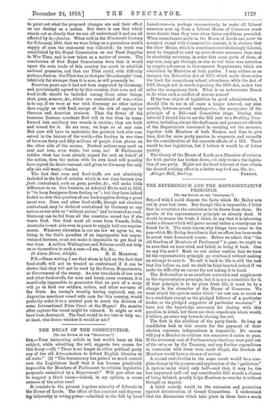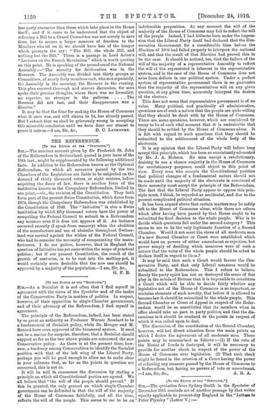THE REFERENDUM AND THE REPRESENTATIVE PRINCIPLE.
tTo TIM EDITOR OP THE "BrEcrwros.'1 SIrt,—I wish I could dispute the facts which Mr. Bailey sets out in your last issue. But though this is impossible, I think that he overstates the conclusion to be drawn from them. He speaks of the representative principle as already dead. It would be nearer the truth, I think, to say that it is labouring under a disease which will prove mortal unless a remedy can be found for it. The main reason why things have come to the pass which Mr. Bailey describes is that no effort has been made to arrest their downward course. Before we admit that "the old freedom of Members of Parliament" is gone, we ought to be sure that we have tried, and failed, to bring it back. Can we say this now P Must we not rather confess that we have let the representative principle go overboard without making an attempt to save it. To call it back to life is still the task that lies before us, and we shall be faint-hearted indeed if we make its difficulty an excuse for not taking it in hand.
The Referendum is an excellent corrective and supplement to the representative principle, but it is not a substitute for it. If that principle is to be given fresh life, it must be by a change in the character of the House of Commons. We must attack the system under which " no one can so much as be a candidate except as the pledged follower of a particular leader, or the pledged supporter of particular measures." I have not the knowledge necessary for dealing with this question in detail, but there are three expedients which would, I believe, go some way towards abating the evil.
The first is the abolition of the party funds. So long as candidates look to this source for the payment of their election expenses, independence is impossible. No caucus will pay a Member to criticise the measures it exists to pass. If the necessary cost of Parliamentary elections were paid out of the rates or by the Treasury, and any further expenditure in connexion with them were made illegal, the freedom of Members would have a chance of revival.
A second contribution to the same result would be a com- plete change in the purpose and application of the " guillotine." A system under which only hall—and that, it may be, the less important half—of any considerable Bill stands a chance of being debated, greatly helps Members to vote for it without thought or inquiry.
A third remedy would be the extension and protection against deterioration of Grand Committees. I understand that the discussions which take place in them have a much less party character than those which take place in the House itself ; and if it came to be understood that the object of referring a Bill to a Grand Committee was not merely to save time, but to secure a larger measure of freedom to the Members who sit on it, we should have less of the temper which prompts the cry : " The Bill, the whole Bill, and nothing but the Bill." There is a passage in Lord Acton's "Lectures on the French Revolution" which is worth quoting on this point. He is speaking of the procedure of the National Assembly:—" The security for deliberation was in the Bureaux. The Assembly was divided into thirty groups or Committees, of nearly forty members each, who met separately, the Assembly in the morning, the Bureaux in the evening. This plan ensured thorough and sincere discussion, for men spoke their genuine thoughts, where there was no formality, no reporter, no stranger in the galleries The Bureaux did not last, and their disappearance was a disaster."
It may be that the time for making the House of Commons what it once was, and still claims to be, has already passed. But I submit that we shall be grievously wrong in accepting this miserable conclusion until we have done our utmost to







































 Previous page
Previous page